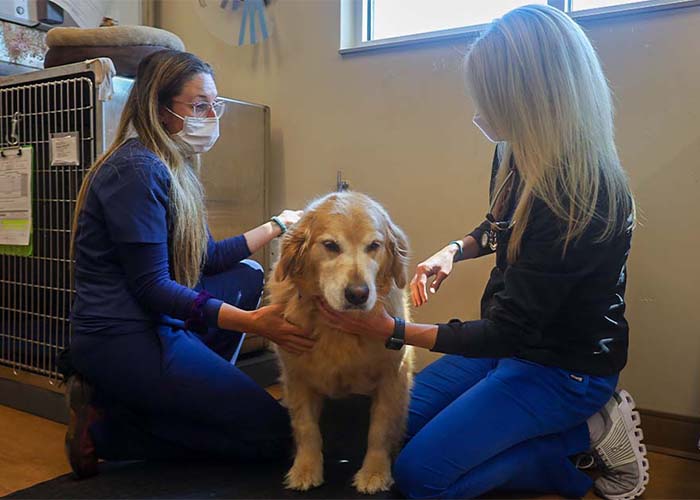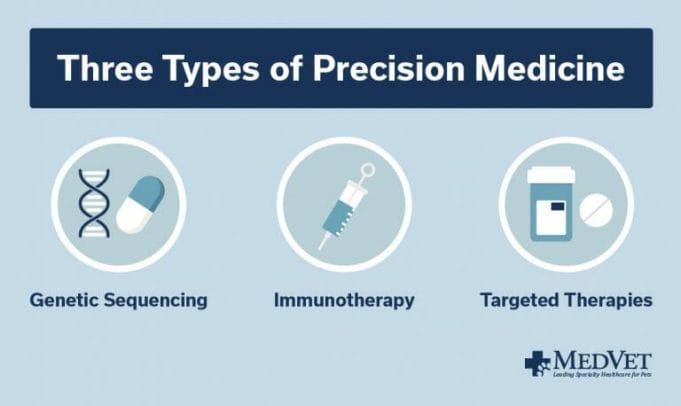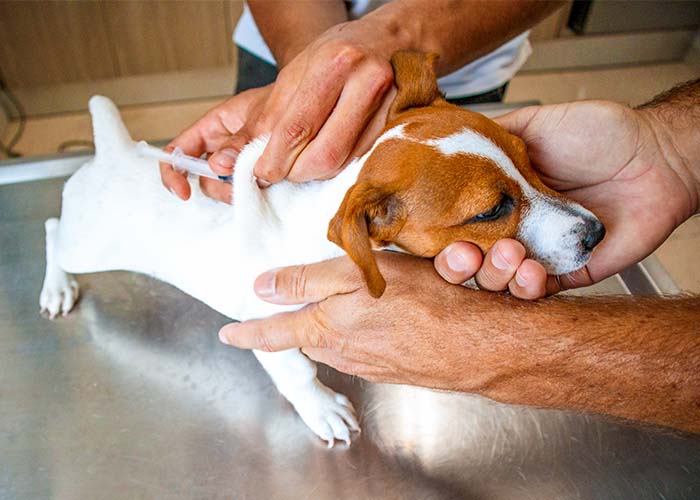Medical Oncology
Precision Medicine: Could this Transform the Way we Treat Dogs with Cancer?

Hearing a diagnosis of cancer in your pet can be devastating. Many pet parents elect to pursue cancer treatments for their pets in hopes of prolonging their survival time with a good quality of life. Like pet parents, veterinary oncologists are also always looking for ways to help dogs live longer with cancer while maintaining their quality of life. Fortunately, advances in veterinary cancer therapy now allow many pets to achieve this balance of living longer and feeling better with their disease.
Traditionally, radiation therapy, chemotherapy, and surgery have been the sole means of treating dogs with cancer. Although these treatments are very well tolerated, we may have maximized the survival times achievable with these modalities. Precision medicine is an exciting, new treatment option in veterinary oncology that may make a major difference in how we approach cancer therapy in pets.
What is Precision Medicine?
By definition, precision medicine is a medical model that proposes the customization of healthcare, with medical decisions, treatments, practices, and products tailored to a subgroup of patients, instead of a one-drug-fits-all model. In veterinary medicine, we use three major categories of precision medicine including genetic sequencing, immunotherapy, and targeted therapies. With all three, the dog’s genes are used to uncover the best treatment option(s).

Genetic Sequencing
With genetic sequencing, we can locate cancer-causing genes and mutations, then recommend drugs to target these genes and mutations. Fidocure® is a precision medicine company examining the genome of the specific tumor to look for mutations, which allows the veterinary oncologist to recommend targeted drugs to treat the specific mutations in your dog’s tumor. Many of the recommended targeted therapies are oral drugs that are compounded specifically for your pet and administered at home. Although the treatments are administered orally at home, the pet will still require routine recheck examinations and diagnostic tests with the veterinary oncology team to ensure that it is safe to continue with the treatments and that they are effective for your dog’s cancer. Tumor types commonly treated using the genomic sequencing include splenic/non-splenic hemangiosarcoma, transitional cell carcinoma, melanomas, anal sac adenocarcinoma, osteosarcoma, mast cell tumors, B-cell lymphoma, and many more.
How genetic sequencing works
With Fidocure®, the veterinary oncologist will send your pet’s tumor biopsy to the company, and they will create a personalized DNA report that helps identify genetic mutations that may influence treatment. This report will provide information regarding which targeted therapies may work best for your pet’s tumor, and it may recommend injectable chemotherapies that may be effective based on specific gene sequences and mutations. Most oncologists will use the genomic report as well as the biopsy report, stage of the cancer, and breed of the dog to create a personalized treatment plan for your pet.
Many oncologists will add targeted treatments to the standard of care, which are the more traditional therapies such as chemotherapy, radiation therapy, and surgery. However, the targeted therapies may also be used as the sole treatment for your pet’s cancer, which offers alternatives to more invasive treatments or a new option when traditional therapies fail. Your veterinary oncologist will be able to provide the best treatment recommendations for your pet. It is important to remember that we are still learning the best way to utilize genomic sequencing in our canine cancer patients.
Finding future treatments
An additional goal of genomic sequencing is to develop new targeted therapies to benefit dogs with cancer. In human oncology, there are 1.6 million people diagnosed with cancer annually, and they have more than 84 targeted therapies in use. However, in veterinary oncology, there are an estimated 6 million new cases annually, and only two approved targeted therapies for cancer treatment. By gathering response data and outcomes to the genomic therapy recommendations, we hope to increase the number of targeted therapies used in veterinary medicine to also improve cancer treatments for future pets.
Immunotherapy
Immunotherapy is another form of precision medicine. Immunotherapy identifies ways to customize treatments using your pet’s immune system to fight the cancer. One commonly used form of immunotherapy in veterinary medicine is autologous cancer vaccines, which are vaccines created from your pet’s specific tumor. If your pet is a candidate for an autologous cancer vaccine, then your veterinary oncologist will submit the tumor biopsy to a company to determine the type of cancer and develop the vaccine. It is important that the tumor biopsy be submitted directly to the company before it is put in formalin, so this must be planned prior to surgical removal of the tumor.
One company that is creating autologous cancer vaccines is Torigen® Pharmaceuticals. They create whole tissue vaccines, which means that it includes inactivated mutated tumor cells as well as the extracellular matrix, which is the support structure of the tumor. The benefits of using whole tissue vaccines are that it contains relevant tumor antigens (targets for the immune system) and can be produced without knowing the specific antigens of your pet’s tumor. Additionally, tumor vaccines are well tolerated, and seem to be efficacious in human oncology. Lastly, tumor vaccines may be less expensive than chemotherapy, and it is another treatment option for pet parents who do not want to use chemotherapy in treating their pet’s cancer.

How the vaccine works
To make the autologous tumor vaccine, your pet’s inactivated tumor is combined with an immune stimulating product, that when administered as an injection under the skin, trains the immune system to find and fight the residual cancer in the body. The vaccine typically takes a couple of weeks to create and is then shipped to your veterinary oncologist’s office. The vaccine is administered under the skin weekly for three treatments. In safety studies, the vaccine was very well tolerated with few side effects including a reaction at the injection site, lethargy, and fever. These side effects resolved without intervention. The vaccines also seem to be well tolerated and safe in cats from initial studies.
The Torigen® autologous cancer vaccine has been used to treat hemangiosarcomas, anal sac adenocarcinoma, fibrosarcomas, mast cell tumors, melanomas, soft tissue sarcomas, hepatocellular carcinomas, nasal carcinomas, squamous cell carcinoma, transitional cell carcinoma, lymphoma, and many more.
As with any new treatment, we are still gathering data to determine the best responses, best candidates, and survival benefits. There is one published study evaluating the use of the Torigen® autologous cancer vaccine for dogs with stage III hemangiosarcoma, which means that it has already spread. In that study, eight dogs were treated with the Torigen® vaccine, and approximately 12.5% of these dogs were alive at one year compared to 0% for dogs treated with surgery alone or surgery and chemotherapy in historic studies. Thus, it may be beneficial in the treatment of dogs with stage III hemangiosarcoma; however, as with any new treatment, we are still gathering information on the best way to use autologous cancer vaccines.
Targeted Therapies
Targeted therapies act on specific molecular targets that are associated with cancer, whereas most traditional chemotherapies act on all rapidly dividing normal and cancerous cells. Chemotherapy and targeted therapy are both treatments that attack cancer cells. However, targeted therapy is less toxic to healthy cells than chemotherapy, and both options are often done in conjunction with other treatments such as surgery and radiation therapy.
Currently, there are two veterinary approved targeted therapies in veterinary medicine: Palladia® (toceranib phosphate) and Laverdia-CA1® (verdinexor). Palladia® is the only antiangiogenic (inhibits blood vessels) and antiproliferative therapy specifically developed for the treatment of canine cancer. It also specifically targets mutations in cancer cells such as c-kit, and possibly many more. Palladia® is administered orally at home and is used to treat a variety of tumor types including mast cell tumors, thyroid carcinomas, anal sac adenocarcinomas, and many more. Although it is administered orally at home, close monitoring with frequent recheck examinations and diagnostic tests with the veterinary oncologist are important to ensure that it is safe to continue with the therapy as well as to assess the efficacy.
Laverdia® is the first FDA conditionally approved oral tablet to treat lymphoma, and it specifically targets nuclear transport within the cancer cell. Lymphoma is the most diagnosed cancer in dogs, so this provides another treatment option for lymphoma, and may be a good option for pet parents who do not want to use injectable chemotherapy for treatment. Again, frequent recheck examinations with the oncology team are an important part of monitoring your pet. As mentioned with the other treatments, we are continuously gathering data on the best use and response to treatment with these therapies.
Work with Your Veterinary Team
Not all patients may be candidates for precision medicine, and we still have a lot to learn about the true benefits in veterinary oncology since this is a new form of treatment. We are still gathering data about precision medicine, and each pet treated helps provide information on the effectiveness of the treatment, which will, hopefully, benefit all pets diagnosed with cancer in the future. We would encourage you to speak to a veterinary oncologist to determine if your pet is a candidate for precision medicine, and which form of precision medicine may be best for your pet’s treatment plan. Learn more about MedVet’s medical oncology services and see if there is a veterinary oncologist near you.